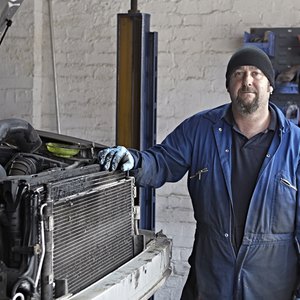
Auto mechanics have the ability to write off certain expenses critical for their work when figuring out their taxable income. Mechanics who work for an employer list these costs as unreimbursed employee expenses on Form 2106. Self-employed auto mechanics list both business revenue and expenses on Schedule C of Form 1040.
Tips
Auto mechanics will likely be able to deduct a variety of expenses associated with their profession, including their work tools, protective gear, occupational clothing and training, among others.
Your Work Tools
As a mechanic, you may be required to bring your own tools into the shop. The cost of any tools, machinery and supplies you purchase that allow you to perform your work are deductible. Tool sets with bolts, screws, screwdrivers, wrenches, joints and bars are deductible. So are items like backpacks, belt bags, electronic organizers and notebooks. You can deduct the cost of these items only to the extent that you use them for business. For example, if you use the backpack 60 percent of the time for work and 40 percent of the time for personal use, you can only deduct 60 percent of the cost.
Clothing and Protective Gear
Normally, the cost of clothes that you buy for work aren't deductible. However, you can write off the cost of mandatory uniforms you buy and any costs you incur to clean, repair and maintain the uniforms. To qualify, purchasing the uniform must have been a condition of employment and the clothes must be unsuitable for everyday use. That means that jumpers, pants, shirts and jackets can be deductible if they have a company logo on them. On the other hand, you can't write off the cost of generic black pants and a black shirt, even if your employer requests you wear all black. You can also write off any protective gear and clothing that's required to do your job. Work gloves, boots, safety glasses and hard hats all are potential deductions.
Your Training Expenses
Training expenses for programs that help you maintain or improve your skill as an auto mechanic are a deductible expense. The cost of materials, books, registration fees and travel to the training site all may be deducted. If you need to stay overnight to complete the training, anything you pay for a hotel stay and half of your meals expense is also deductible.
Other Possible Expenses
Unlike employed auto mechanics, self-employed auto mechanics can deduct all the ordinary and necessary costs of doing business. Exact expenses range vary slightly based on the business but common expenses for auto mechanics include:
- Mileage expense to visit clients
- Membership dues and professional subscriptions
- Business licenses
- State and local taxes
- Equipment, work supplies and office supplies
- Rent, utilities, property taxes on a space you rent for work
- Rent, utilities, property taxes, repairs and maintenance on your home, if you qualify for the home office deduction
- Professional fees to attorneys or accountants
- Marketing, advertising and website expense
- Business insurance
References
Writer Bio
Based in San Diego, Calif., Madison Garcia is a writer specializing in business topics. Garcia received her Master of Science in accountancy from San Diego State University.

